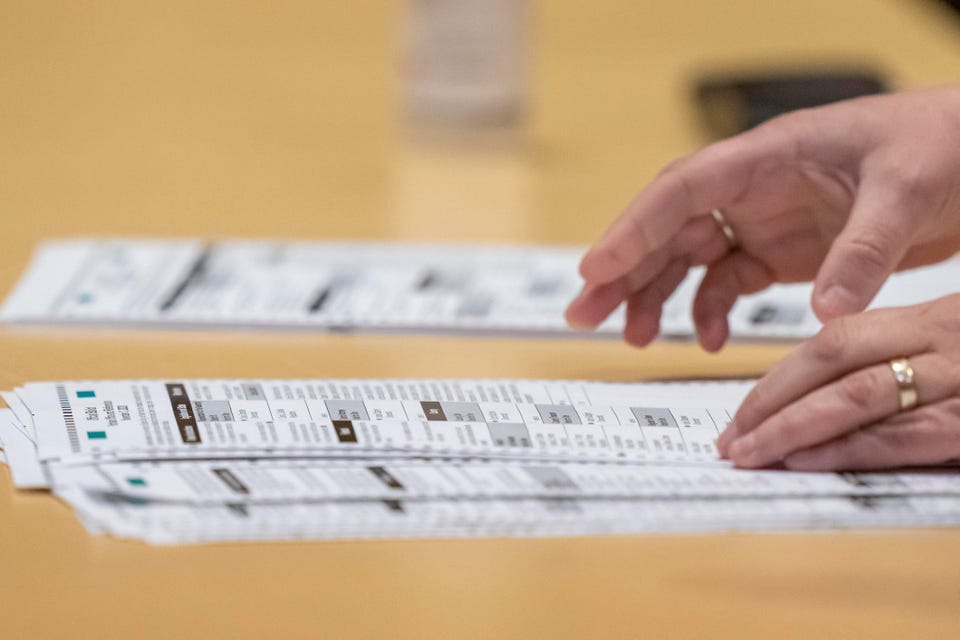Breaking Business Don’t Expect To Know The Midterm Winners On Tuesday—Here’s Why These States Could See Delays Sara Dorn Forbes Staff Politics Following New! Follow this author to stay notified about their latest stories. Got it! Nov 6, 2022, 03:00pm EST | Share to Facebook Share to Twitter Share to Linkedin Topline In a midterm year with high turnouts expected and a number of close races that will decide which party controls the Senate, election results—which hinge on a labyrinth of rules that vary widely by state—may not become clear for days or even weeks. MADISON, WI – NOVEMBER 20: A election worker shows ballots to representatives for President Donald .
. . [+] Trump during the presidential recount vote for Dane County on November 20, 2020 in Madison, Wisconsin.
President Donald Trump requested a recount of ballots in Milwaukee and Dane counties in Wisconsin, hoping to overturn his narrow defeat in the state to Democratic presidential nominee Joe Biden. Trump’s campaign paid the state $3 million to cover the cost of the recount. (Photo by Andy Manis/Getty Images) Getty Images Key Facts Georgia: The Senate race between Sen.
Raphael Warnock (D) and Republican Herschel Walker will head to a runoff election in four weeks if neither candidate wins 50% of votes ( a likely scenario considering the candidates are polling within less than two points of each other), but counties are required to report absentee results by 5 p. m. on the day after the election, per a sweeping voting law change enacted in 2021.
Pennsylvania: The process of opening and counting mail-in ballots in Pennsylvania—where Lt. Gov. John Fetterman (D) and Republican Mehmet Oz are in a tight race for the Senate—can’t begin until Election Day and will likely take days, Pennsylvania acting Secretary of State Leigh Chapman has repeatedly warned .
Nevada: Several factors could delay voting results, including the state’s practice of sending absentee ballots to all voters per legislation passed in 2021, along with rules that require election workers to wait until the polls close to begin counting absentee ballots (ballots postmarked by November 8 can be counted as long as they’re received by November 12). Michigan: Results are expected to be delayed at least a day due to a high volume of absentee ballots, Secretary of State Joceyln Benson said Thursday , noting more than 1. 1 million absentee ballots have been returned, the majority of which are likely from people who historically voted Democrat , but they can not be opened or tabulated until polls close at 8 p.
m. on Election Day. Arizona: The state, where a large share of the population votes by mail, can begin counting absentee ballots ahead of the election, but Secretary of State Katie Hobbs (D), who is also running for governor, has said day-of results are “just not going to happen,” she said in October .
Wisconsin: Wisconsin can begin counting absentee ballots once the polls open on Election Day, but results are not expected “until the early morning hours after Election Day,” Wisconsin Elections Commission spokesperson Riley Vetterkind said in a recent statement to The Hill. Alaska: The state could be one of the last to produce results, because elections are done by ranked-choice voting and absentee ballot-counting can’t begin until after the polls close on Election Day—if one candidate wins the majority, they are declared the winner and the process stops there, but if no candidate wins the majority, the candidate with the fewest votes is eliminated and the second choice of voters who selected the eliminated candidate are reallocated, a process that continues until two candidates are left and the one with the most votes wins. Key Background Following the 2020 presidential election, Trump and his supporters claimed results should be determined the night the polls close–an effort to discredit the absentee ballot-counting process in a year when nearly 60% of Biden voters cast ballots by mail .
While results did take longer in 2020 due to high percentages of voters in both parties choosing to vote early and avoid the polls on Election Day amid the Covid-19 pandemic, Trump falsely claimed that results have historically been determined on Election Day. In fact, delays in election results date back more than a century. In 1876, Americans waited four months before former President Rutherford B.
Hayes was declared the winner of the election, and in 2000, former President George W. Bush won after a month-long recount in Florida that ended in a Supreme Court decision in his favor. Tangent A number of GOP candidates have not committed to accepting election results, including Arizona gubernatorial candidate Kari Lake and Wisconsin Sen.
Ron Johnson. Both candidates have pushed unfounded fraud claims that the 2020 presidential election was rigged in President Joe Biden’s favor. Big Number 36,436,068.
That’s the number of early in-person votes and mail-in ballots tallied (but not yet certified) as of Friday, according to the US Elections Project. Turnout this year is expected to rival 2018, when 53. 4% of the eligible population voted in the midterm election, the highest rate since at least 1978.
Further Reading Why election results may not be known right away (The Associated Press) Florida Surpasses 1 Million Ballots Cast As Experts Predict High Midterm Voter Turnout (Forbes) Follow me on Twitter . Send me a secure tip . Sara Dorn Editorial Standards Print Reprints & Permissions.
From: forbes
URL: https://www.forbes.com/sites/saradorn/2022/11/06/dont-expect-to-know-the-midterm-winners-on-tuesday-heres-why-these-states-could-see-delays/



